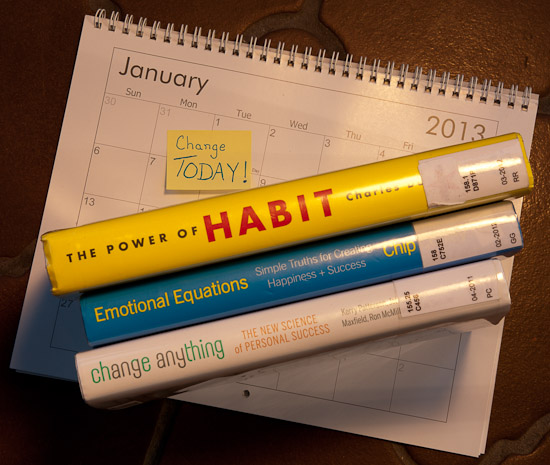
As anyone who has tried to keep a resolution knows, change is hard. Many of us over 50 have given up long ago on the idea that making a New Year's resolution is a path to anything but disappointment. It may be time to try again, however. In recent years, authors have mined the work of positive psychologists and happiness researchers for ways to improve our chances of success.
For those of us who struggle with resolutions, it may be helpful to step back. Before focusing on the resolution, take some time to learn the best our culture has to offer on how people meet goals, break bad habits and establish good ones.
Three books published in the last two years caught my attention as I considered what techniques might help me keep my New Year's resolutions. "Change Anything: The New Science of Personal Success" is by the people at Vital Smarts, a training company that works with organizations and individuals to improve effectiveness. In "The Power of Habit," journalist Charles Duhigg looks at the research about how we form and break habits. "Emotional Equations" by Chip Conley distills the wisdom of classic philosophy and modern psychology into easy-to-remember formulas that can be solved in moments of duress to improve the outcome of the situation.

From these three books, I gleaned three strategies to help us keep our New Year's resolutions in 2013.
Don't rely on willpower. Willpower is overrated as a means for making sustainable changes in our lives.
The authors of "Change Anything" called this the willpower trap:
"When people believe that their ability to make good choices stems from nothing more than their willpower -- and that willpower is a quality they're either born with or they're not -- they eventually stop trying altogether. The willpower trap keeps them in a depressing cycle that begins with heroic commitment to change, which is followed by eroding motivation and terminated inevitably by relapse into old habits."
Charles Duhigg, in "The Power of Habit," explored the metaphor of willpower as a muscle. Willpower can be fatigued by one task and, therefore, unavailable for a later one. This explains why a resolution to exercise after work will falter at the end of an unexpectedly hard day.
On the other hand, "The Power of Habit" also covered studies showing that willpower can be strengthened over time. A success in one area that requires willpower, say going to the gym, can revitalize other healthy habits like eating better. Willpower can help in the long run, but isn't the only tactic available.
Develop new skills. "Change Anything" advocates skill acquisition as a powerful tool:
"Every time you try your best to do what you know is right and you fail, there's a good chance that your failure can be traced in part to a gap in knowledge or a missing skill."
As a librarian, I use books to increase my knowledge and skills. There is a book, or many, for most resolutions, from eat healthier to improve my photography.
In "Emotional Equations," Chip Conley pointed out that any skill takes practice:
"If you stick with a skill, you start to see some improvement over time until you hit the dreaded plateau when your skill level just seems to coast for a while even though you're pouring energy into improving. Then, all of a sudden, you find that your skill ratchets up to the next level. That's how mastery works. It's not one smooth, upward-facing line of improvement; it happens in fits and starts."
Get support. Have you joined or created a support group for your New Year's resolution? According to "The Power of Habit," this may be a vital step in the success of your venture.
"The evidence is clear: If you want to change a habit, you must find an alternative routine, and your odds of success go up dramatically when you commit to changing as part of a group. Belief is essential, and it grows out of a communal experience, even if that community is only as large as two people."
"Change Anything" used the term "accomplices" for people in our lives who enable our bad habits and "friends" for people who empower behaviors that aid in meeting our goals. Fortunately, accomplices can sometimes be turned into friends.
With tips from these three books and the underlying modern research, even those of us over age 50 can learn new tricks to succeed at keeping our New Year's resolutions. With the support of my friends, many of whom I find in online venues, I will work on skill development while I gently exercise my willpower in ways that make it stronger.
Join Joy Weese Moll on her personal blog for a New Year's Resolution Reading Challenge
For more New Year book interaction, follow @joyweesemoll on Twitter or the hashtag #NewYearBooks